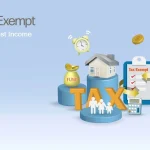When it comes to taxes, determining residency is the first and most crucial step. For American expats living in Canada, the Canadian tax system can be particularly complex, especially with the need to navigate the tax laws of both Canada and the United States. Canada determines tax residency using both primary and secondary criteria, and for those who are considered residents, there is an obligation to report worldwide income. In this blog, we’ll delve into how Canada determines tax residency, the significance of Cross-Border Financial Planning, and why working with a Canada US Expat Advisor or a Cross-Border Financial Advisor is vital to managing taxes effectively.

Content
Determining Tax Residency in Canada
Tax residency in Canada is not solely based on immigration status or physical presence. Instead, it is determined by several factors that are categorized into primary and secondary ties.
Primary Ties
Canada’s tax authorities, the Canada Revenue Agency (CRA), look at three primary factors to determine whether an individual is a tax resident:
- Permanent Home: The location of your permanent home is one of the strongest indicators of tax residency. If you have a dwelling in Canada that you maintain throughout the year, you are likely to be considered a tax resident. This home could be owned or rented, and the presence of personal belongings can also reinforce the tie to Canada.
- Spouse or Common-Law Partner: If your spouse or common-law partner lives in Canada, this is a significant factor in determining your residency status. The assumption is that if your family is established in Canada, your primary social and economic life is also in the country.
- Dependents: The presence of dependents in Canada, such as children, is another strong indicator of Canadian tax residency. Where your children go to school, receive healthcare, and participate in community activities can influence the CRA’s determination of your tax status.
Secondary Ties
In addition to primary ties, the CRA also considers secondary factors when determining tax residency. While secondary ties are not as strong as primary ties, a combination of several secondary ties can establish residency. These include:
- Social Ties: Memberships in Canadian clubs, associations, or churches.
- Economic Ties: Canadian bank accounts, credit cards, investments, or employment contracts.
- Health Care Coverage: Enrollment in provincial or territorial health insurance plans.
- Driver’s License and Vehicle Registration: Holding a Canadian driver’s license or registering a vehicle in Canada.
- Personal Property: Keeping personal belongings, such as furniture, in Canada.
- Canadian Passport: If you possess or apply for a Canadian passport, this could suggest an intention to maintain ties with Canada.
Deemed Residency
Even if you do not have significant primary or secondary ties to Canada, you may still be considered a deemed resident for tax purposes under certain circumstances. For instance, if you spend 183 or more days in Canada within a calendar year, you may be deemed a resident and required to pay Canadian taxes on your worldwide income.
Reporting Worldwide Income
One of the key obligations of being a Canadian tax resident is the requirement to report worldwide income. This means that American expats living in Canada must report not only their Canadian income but also any income earned from foreign sources, including the United States.
The CRA requires residents to disclose all income, regardless of where it was earned. This includes salaries, dividends, interest, rental income, and capital gains from international investments. Moreover, foreign tax credits may be available to mitigate double taxation, but these must be carefully managed through the filing process.
For American expats, this can become particularly complicated due to the requirement to file taxes in both the U.S. and Canada. The U.S. operates on a citizenship-based taxation system, meaning that American citizens and green card holders must file U.S. taxes annually, regardless of where they live. As a result, Cross-Border Financial Planning becomes crucial to ensure compliance and optimize tax outcomes.
The Importance of Cross-Border Financial Planning for Expats
Cross-Border Financial Planning is not just about preparing tax returns; it involves a comprehensive approach to managing finances across borders. For American expats living in Canada, this means addressing the tax implications in both countries, managing retirement accounts, and planning for estate taxes. The complexity of dealing with two tax systems, each with its own set of rules, makes cross-border financial planning essential.
Here are several key reasons why cross-border financial planning is critical for expats:
1. Double Taxation
Without careful planning, American expats living in Canada could face double taxation, where the same income is taxed by both the U.S. and Canada. While tax treaties and foreign tax credits can help reduce this burden, they are not automatic. Proper planning and accurate filing are required to claim these benefits.
2. Retirement Planning
Retirement accounts in the U.S. and Canada have different rules, and transferring or withdrawing funds from these accounts can have significant tax implications. For example, the U.S. has specific regulations around IRAs and 401(k)s, while Canada has RRSPs and TFSAs. Cross-Border Financial Planning ensures that retirement funds are managed in a tax-efficient manner.
3. Estate Planning
Estate taxes and inheritance rules differ significantly between the U.S. and Canada. A Canada US Expat Advisor can help ensure that your estate plan is structured to minimize taxes and that your assets are transferred according to your wishes, without unnecessary tax burdens.
4. Investment Management
Investments held in one country can be subject to tax rules in both countries, potentially leading to unexpected tax liabilities. A Cross-Border Financial Advisor can help you select investment vehicles that are tax-efficient and compliant with the laws of both Canada and the U.S.
5. Currency Exchange
Currency fluctuations between the Canadian dollar and the U.S. dollar can impact your financial situation. Effective cross-border planning includes strategies to manage currency risk, especially when dealing with retirement income or large financial transactions.
Why a Cross-Border Financial Advisor is Key
Given the complexity of managing finances across two countries, working with a Cross-Border Financial Advisor is essential. These professionals specialize in the financial planning needs of expats and have expertise in both Canadian and U.S. tax laws. Here’s why they are invaluable:
1. Expertise in Dual Taxation
A Cross-Border Financial Advisor understands the intricacies of the tax systems in both the U.S. and Canada. They can help you navigate the tax treaty between the two countries, ensuring that you take advantage of all available credits and deductions to minimize your tax liability.
2. Personalized Financial Strategies
Every expat’s financial situation is unique, and a Canada US Expat Advisor can provide personalized advice tailored to your specific needs. Whether you are saving for retirement, planning to buy a home, or managing an inheritance, a cross-border advisor can create a strategy that aligns with your goals while considering the tax implications in both countries.
3. Compliance with Tax Laws
One of the biggest challenges for American expats living in Canada is staying compliant with the tax laws of both countries. The U.S. has strict reporting requirements for foreign accounts (FBAR) and other financial assets, and failure to comply can result in severe penalties. A Cross-Border Financial Advisor ensures that all your financial activities are reported accurately and on time.
4. Mitigating Tax Risks
A Cross-Border Financial Advisor can identify potential tax risks before they become problems. By proactively addressing issues like double taxation, pension withdrawals, or estate planning, they can help you avoid costly mistakes and ensure that your financial plan is tax-efficient.
5. Holistic Financial Planning
Cross-border financial planning is not just about taxes; it’s about your overall financial well-being. A Canada US Expat Advisor considers all aspects of your financial life, including investments, retirement, insurance, and estate planning, to create a comprehensive plan that addresses your long-term goals.
Conclusion
For American expats living in Canada, navigating the complexities of tax residency, worldwide income reporting, and cross-border financial planning is challenging but essential. Determining your tax residency in Canada involves a careful assessment of your primary and secondary ties, and once residency is established, the obligation to report worldwide income can have significant tax implications.
The importance of Cross-Border Financial Planning cannot be overstated. With the potential for double taxation, the need for careful retirement and estate planning, and the challenges of managing investments across borders, having a solid financial plan is critical. Working with a Cross-Border Financial Advisor or a Canada US Expat Advisor is key to mitigating taxes, ensuring compliance, and optimizing your financial future. By leveraging their expertise, you can navigate the complexities of cross-border finance and achieve your financial goals while minimizing your tax burden.

Ryan Myers is a business blog author and writer. He graduated from the University of California, Berkeley in 2009 with a degree in Political Science. His favorite topics to write about are blogging for small businesses and becoming an entrepreneur.







